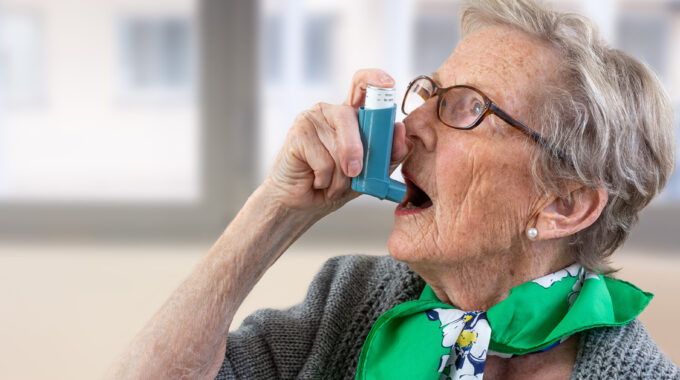
Nearly Half of COPD Patients Not Keeping Up with Meds – Despite COVID-19
Chronic obstructive pulmonary disease (COPD) is a chronic airflow obstruction. It can include bronchitis, emphysema, and chronic asthmatic bronchitis. As the fourth leading cause of death in the U.S., it is progressive and only partially reversible.1 The damage it causes to lungs is permanent. Fortunately, most people can achieve good symptom control and quality of life with proper medical treatment. Inhaled medications such as bronchodilators and steroids serve as a cornerstone of many treatment plans. On the other hand, patients commonly do not use these medications as prescribed.2 People with better adherence enjoy lower all-cause mortality.3
COPD and COVID-19
COPD stands out as one of the strongest risk factors for poor outcomes in COVID-19 cases. People with COPD have a higher risk for intensive care, invasive ventilation, and death if they contract COVID.4 The pandemic raises the importance of managing COPD as well as possible.
COPD Inhaler Adherence – Dosing
Dr. Leanne Kaye and colleagues were curious about whether the current pandemic inspired greater COPD treatment adherence.5 Using data from a remote monitoring system, they analyzed adherence to controller inhaler use for 7,578 patients comparing the first week of January to the last week of March 2020. At baseline, 53.7% of patients use their inhalers 75% of the prescribed times or better. By some measures, following dosing instructions 75% of the time is considered successful adherence. By March, the raw numbers suggested some improvement, but after statistically adjusting for age, the difference did not reach clinical significance. Nearly half of people with COPD do not take their medicine as often as prescribed, even as the pandemic was spreading in the U.S.
COPD Inhaler Adherence – Technique
Dosing adherence is only half of the problem. Using inhalers effectively requires proper technique. Dr. Kaye’s study only measured dosing adherence and would not have detected technique errors. Elderly patients, in particular, are prone to critical technique errors. Among elderly patients, as many as 43% of dry powder inhaler users and 75% of pressurized metered-dose inhaler users demonstrated critically incorrect inhaler technique.6,7 Technique errors are known to develop over time, making it easy for them to go unrecognized.8,9 With only one half of patients using their inhalers on schedule and maybe more than half of those not using the inhalers correctly, we get a picture of elderly patients with COPD commonly not attaining the treatment benefits available.
Home Health and COPD
When to Use Home Health
For elderly, homebound patients, home health stands out as an easy solution for improving COPD. If elderly patients are experiencing worsening symptoms, they can ask their doctors for a COPD management program from the home health agency of their choice.
Home Health Nursing for COPD
Research has shown weekly educational visits over two months to improve self-reported quality of life, decrease hospitalizations by 27%, and decrease emergency department visits by 21%.10,11 Approaches may include:
- Skilled observation and assessment
- 24-hour nurse on-call during times when exacerbation is likely
- Review of inhaler technique and schedule
- Teaching to help recognize signs and symptoms of exacerbation
- Teaching on the latest nutritional interventions
- Help developing an emergency action plan
Home Health Rehab for COPD
Even after hospital discharge, early exercise training at home improves exercise tolerance, dyspnea scores, and quality of life. In-home exercise training reduces the number of exacerbations.12 Therapists can also teach energy conservation techniques that improve independence at home. As little as eight visits from a Medicare-certified home health agency providing nursing and therapy was shown to more than double maximum phonation time and increase peak expiratory flow 70%.13
References
- Petty TL. The history of COPD. International Journal of Chronic Obstructive Pulmonary Disease. 2006 Mar;1(1):3.
- López-Campos JL, Gallego EQ, Hernández LC. Status of and strategies for improving adherence to COPD treatment. International Journal of Chronic Obstructive Pulmonary Disease. 2019;14:1503.
- Jardim JR, Nascimento OA. The importance of inhaler adherence to prevent COPD exacerbations. Medical Sciences. 2019 Apr;7(4):54.
- Tal-Singer R, Crapo JD. COPD at the time of COVID-19: a COPD Foundation perspective. Chronic Obstructive Pulmonary Diseases: Journal of the COPD Foundation. 2020;7(2):73.
- Kaye L, Theye B, Smeenk I, Gondalia R, Barrett MA, Stempel DA. Changes in medication adherence among patients with asthma and COPD during the COVID-19 pandemic. The Journal of Allergy and Clinical Immunology: In Practice. 2020 Jul 1;8(7):2384-5.
- George M, Bender B. New insights to improve treatment adherence in asthma and COPD. Patient Preference and Adherence. 2019;13:1325.
- Khassawneh B, Al-Ali M, Alzoubi K. Handling of inhaler devices in actual pulmonary practice: metered-dose inhaler versus dry powder inhalers. Respir Care. 2008; 53: 324-8.
- Chapman K, Boulet L, Rea R. Physician self-audit of asthma control in primary practice: the implications for implementation of guidelines. Am J Respir crit CareMed. 2004; 169: A362.
- Virchow J, Crompton G, Dal Negro R, et al. Importance of inhaler devices in the management of airway disease. Respir Med. 2008; 102: 10-9.
- Bourbeau J; Julien M, Maltais F, et al. Reduction of hospital utilization in patients with chronic obstructive pulmonary disease: a disease-specific self-management intervention. Arch Intern Med. 2003; 163 (5): 585-91.
- Gadoury M, Schwartzman K, Rouleau M. et al. Self-management reduces both short- and long-term hospitalisation in COPD. Eur Respir J. 2005; 26 (5): 853-7.
- Murphy N, Bell C, Costello R. Extending a home from hospital care programme for COPD exacerbations to include pulmonary rehabilitation. Respir Med. 2005; 99(10): 1297-302.
- Bausek N, Havenga L, Aldarondo S. Respiratory muscle training improves speech and pulmonary function in COPD patients in a home health setting-a pilot study. BioRxiv. 2019 Jan 1:523746.






